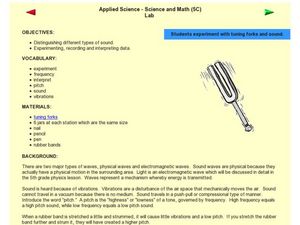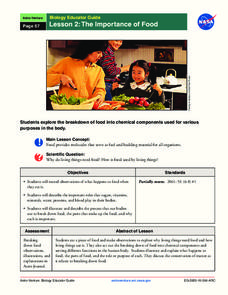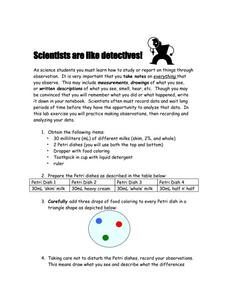Howard Hughes Medical Institute
Gorongosa: Scientific Inquiry and Data Analysis
How does the scientific process begin? Introduce ecology scholars to scientific inquiry through an insightful, data-driven lesson. Partners examine data from an ongoing research study to determine the questions it answers. The resource...
Center for Technology in Teaching and Learning
CSI: The Experience - Family Forensics
Forensic scientists depend on their observation skills to analyze evidence down to the molecular level. Middle and high schoolers practice making observations and predictions with a series of crime scene activities, which includes a...
Curated OER
Viewing Bacteria
Have you ever wanted to know the true structure of E.coli? Does the thought of peering into its "small world" sound exciting? Here is a lesson that allows pupils the ability to do just that. Blossoming microbiologists use...
PBS
Cloud Clues
It's cloudy with a good chance of learning! An inquiry-based lesson begins with an exploration of transparent, translucent, and opaque materials. Young scientists then connect their learning to the different cloud types as they take the...
Curated OER
Word Problems Review Sheet
Word problems can make even expert mathematicians go blank. Practice solving word problems with an extended version of the GUESS method (givens, unknowns, equations, solve, substitute), which adds the steps of drawing a diagram, making...
Virginia Department of Education
Three Types of Rocks
Rock out with the second installment of a five-part series on earth materials and processes. Your budding geologists make observations of given rock samples and posit classification systems for rocks. They then learn about the...
Curated OER
Can You Bag It?
Put your class's observational skills to the test with a science experiment about paper and plastic bags. After reading some background knowledge about the materials in plastic grocery bags, third graders interpret a chart to answer a...
Curated OER
We Can't Decide
Second graders investigate decision making skills that they can apply on a daily basis. In this decision making lesson, 2nd graders listen to a read aloud of Pinocchio and make a list of times when decisions have to be made. They access...
Curated OER
Layers of Rock
Juvenile geologists drill clear plastic straws down into a playdough sedimentary rock model, pulling out sample rock cores. As they analyze their cores, they apply the law of superposition and discover that originally horizontal layers...
Colorado State University
Why Does the Wind Blow?
Without wind, the weather man wouldn't have much to talk about! Blow away your junior meteorologists with a creative demonstration of how wind works. The activity uses an empty soda bottle and compressible Styrofoam peanuts to illustrate...
Academy of American Poets
Teach This Poem: “Making History” by Marilyn Nelson
What makes an event newsworthy, worth a reference in a news magazine or textbook? Who decides? These are questions Marilyn Nelson asks readers of her poem "Making History" to consider. To begin, class members list details they notice in...
Curated OER
Bubbles Galore
Students investigate bubbles. For this science lesson, students observe how long bubbles last and graph the results of the experiment.
Curated OER
Moon Observation Sheet
In this moon observation worksheet, students observe the moon for a week, draw their observations, identify the phases of the moon, and indicate the time they observed the moon.
Curated OER
Seedfolks Journal Entry Choices
Keep your class thinking about Seedfolks after they read each chapter by requiring them to keep a journal about the story. Hand out these journal entry prompts at the beginning of the story so that your learners know what to expect. For...
Ohio Department of Education
Observe Then Infer
Upper elementary scientists learn that observations made can lead to inferences. They rotate through six weather-related stations that challenge them to make observations and then draw inferences from their observations. A...
Curated OER
Sound Observations
Students explore sound waves by conducting an experiment in class. In this sound frequency lesson, students utilize a tuning fork in class and identify which objects in class create different sound pitches on the fork. Students conduct...
Curated OER
Make Your Own Compass
Students explore magnetism. In this "magnets" science instructional activity, students make a compass with common household items and explain the relationship between what a compass does and the earth's magnetic fields.
NASA
The Importance of Food
Pupils make observations while eating food. They act out the process of food breaking down in the body and the roles of various chemical components, such as sugar and protein. It concludes with an activity illustrating the process and a...
Kenan Fellows
Sustainability: Learning for a Lifetime – Soil
Do great gardeners really have green thumbs—or just really great soil? Environmental scholars discover what makes Earth's soil and soil quality so important through research and experimentation. Learners also develop an understanding of...
Curated OER
States Of Matter
Delv into the states of Matter. Students engage in the scientific inquiry process to uncover the exciting world of Matter. They watch a series of videos, and conduct experiments in order to collect and analyze data on the various state...
Chicago Botanic Garden
Historical Climate Cycles
What better way to make predictions about future weather and climate patterns than with actual climate data from the past? Young climatologists analyze data from 400,000 to 10,000 years ago to determine if climate has changed over...
Curated OER
A is for . . .
Students discuss the difference between making inferences and observations. They practice making observations and inferences regarding an apple.
Curated OER
Using Your Senses
In this senses worksheet, students answer two questions about observations using the senses. Students then give reasons why each sense may not give them all the information they need when making observations.
Curated OER
Scientist Are Like Detectives
Students demonstrate proper scientific observation skills. For this investigative science lesson, students make observations, record their findings and form conclusions in order to improve their scientific documentation and writing skills.
Other popular searches
- Making Observations Science
- Making Observations Biology
- Ell Making Observations
- Making Observations in Science
- Ell + Making Observations

























